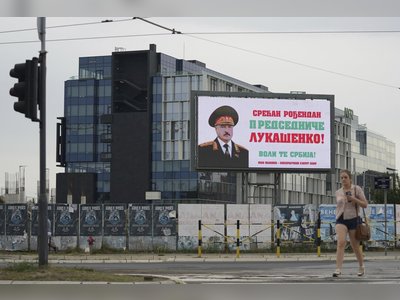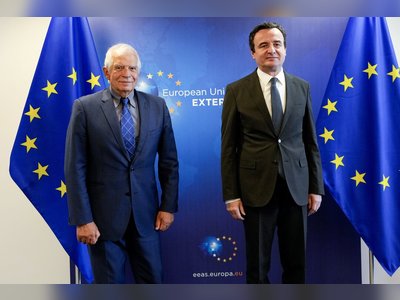
Germany's Military Transformation: A Shift towards Greater Defense Spending
The German Parliament votes to increase military investment, indicating a significant shift in defense policy amid heightened security concerns.
In a significant political development, Germany has recently approved a substantial increase in military spending, with the parliament voting to exempt defense expenditures from strict budgetary rules.
This decision comes in response to escalating security threats perceived from Russia, particularly following its military aggression in Ukraine.
General Karsten Breuer, the highest-ranking officer in the German military, Bundeswehr, articulated urgent concerns over the potential for broader Russian expansionism.
He emphasized the importance of readiness, stating, "Russia poses a threat to us.
President Putin challenges our security, and we must do everything necessary to deter this threat." Breuer projected that NATO must prepare for possible attacks within the next four years.
The decision to increase funding reflects a profound shift in German public and political sentiment regarding military engagement.
Markus Cajner from the German Marshall Fund noted that the Russian invasion of Ukraine has disrupted a longstanding peace-centric worldview in Germany that has persisted for decades.
Cajner stated that the legacy of Germany's involvement in two world wars has created a complex relationship with militarism, leading to a historically cautious approach towards military engagement.
Prior to this, Germany, under former Chancellor Angela Merkel, maintained a policy of engagement with Russia, believing that economic ties would facilitate democratization.
However, this belief faced a stark reality check when Russia invaded Ukraine in February 2022. Chancellor Olaf Scholz subsequently announced a paradigm shift regarding military priorities, launching a so-called 'Zeitenwende' (turning point) that saw an allocation of 100 billion euros to bolster the country's military capabilities.
Despite these new investments, General Breuer indicated that the current state of the Bundeswehr still leaves much to be desired, with assessments revealing significant shortages of resources, equipment, and personnel.
The Bundeswehr's operational readiness has been described as critically insufficient, with a recent parliamentary report highlighting a dire need for upgrades and repairs that could cost up to 67 billion euros.
The suspension of debt limits for military spending is expected to provide a continuous influx of funds to address these deficiencies, allowing for more robust military preparedness.
This unprecedented measure is being spearheaded by Friedrich Merz, the new parliamentary leader, who proposed the budget adjustments shortly before elections that could alter the political landscape.
Public opinion on defense spending has shifted, with recent polls indicating a growing recognition of potential threats, particularly from Russia and the geopolitical ramifications of U.S. foreign policy under President Donald Trump.
A survey showed that 79% of Germans perceived Putin as a significant threat to European security.
Within civil society, attitudes are evolving.
Younger Germans, who grew up with a post-war emphasis on pacifism, are increasingly open to the need for a proactive defense strategy.
This has led to rising support for military investment as essential for safeguarding democratic values and national security.
While the discussions around military conscription are preliminary, Breuer has called for an urgent expansion of troop numbers in Bundeswehr, with estimates suggesting that an additional 100,000 personnel are necessary for adequate defense and NATO commitments.
As debates progress, the concept of reinstating compulsory military service has been flagged as crucial to achieving these targets.
The changes occurring within Germany's defense policy mark a historic transition, reflecting a growing acknowledgment of the complexities of modern security challenges, as the nation prepares to face an uncertain future in an increasingly polarized geopolitical environment.
This decision comes in response to escalating security threats perceived from Russia, particularly following its military aggression in Ukraine.
General Karsten Breuer, the highest-ranking officer in the German military, Bundeswehr, articulated urgent concerns over the potential for broader Russian expansionism.
He emphasized the importance of readiness, stating, "Russia poses a threat to us.
President Putin challenges our security, and we must do everything necessary to deter this threat." Breuer projected that NATO must prepare for possible attacks within the next four years.
The decision to increase funding reflects a profound shift in German public and political sentiment regarding military engagement.
Markus Cajner from the German Marshall Fund noted that the Russian invasion of Ukraine has disrupted a longstanding peace-centric worldview in Germany that has persisted for decades.
Cajner stated that the legacy of Germany's involvement in two world wars has created a complex relationship with militarism, leading to a historically cautious approach towards military engagement.
Prior to this, Germany, under former Chancellor Angela Merkel, maintained a policy of engagement with Russia, believing that economic ties would facilitate democratization.
However, this belief faced a stark reality check when Russia invaded Ukraine in February 2022. Chancellor Olaf Scholz subsequently announced a paradigm shift regarding military priorities, launching a so-called 'Zeitenwende' (turning point) that saw an allocation of 100 billion euros to bolster the country's military capabilities.
Despite these new investments, General Breuer indicated that the current state of the Bundeswehr still leaves much to be desired, with assessments revealing significant shortages of resources, equipment, and personnel.
The Bundeswehr's operational readiness has been described as critically insufficient, with a recent parliamentary report highlighting a dire need for upgrades and repairs that could cost up to 67 billion euros.
The suspension of debt limits for military spending is expected to provide a continuous influx of funds to address these deficiencies, allowing for more robust military preparedness.
This unprecedented measure is being spearheaded by Friedrich Merz, the new parliamentary leader, who proposed the budget adjustments shortly before elections that could alter the political landscape.
Public opinion on defense spending has shifted, with recent polls indicating a growing recognition of potential threats, particularly from Russia and the geopolitical ramifications of U.S. foreign policy under President Donald Trump.
A survey showed that 79% of Germans perceived Putin as a significant threat to European security.
Within civil society, attitudes are evolving.
Younger Germans, who grew up with a post-war emphasis on pacifism, are increasingly open to the need for a proactive defense strategy.
This has led to rising support for military investment as essential for safeguarding democratic values and national security.
While the discussions around military conscription are preliminary, Breuer has called for an urgent expansion of troop numbers in Bundeswehr, with estimates suggesting that an additional 100,000 personnel are necessary for adequate defense and NATO commitments.
As debates progress, the concept of reinstating compulsory military service has been flagged as crucial to achieving these targets.
The changes occurring within Germany's defense policy mark a historic transition, reflecting a growing acknowledgment of the complexities of modern security challenges, as the nation prepares to face an uncertain future in an increasingly polarized geopolitical environment.
AI Disclaimer: An advanced artificial intelligence (AI) system generated the content of this page on its own. This innovative technology conducts extensive research from a variety of reliable sources, performs rigorous fact-checking and verification, cleans up and balances biased or manipulated content, and presents a minimal factual summary that is just enough yet essential for you to function as an informed and educated citizen. Please keep in mind, however, that this system is an evolving technology, and as a result, the article may contain accidental inaccuracies or errors. We urge you to help us improve our site by reporting any inaccuracies you find using the "Contact Us" link at the bottom of this page. Your helpful feedback helps us improve our system and deliver more precise content. When you find an article of interest here, please look for the full and extensive coverage of this topic in traditional news sources, as they are written by professional journalists that we try to support, not replace. We appreciate your understanding and assistance.










